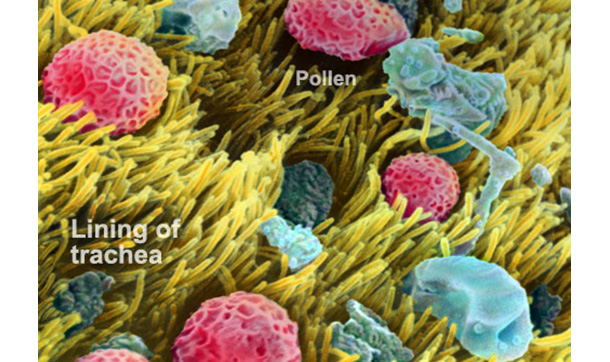Recent advisories from the Pima County Department of Environmental Quality on the potential for elevated levels of wind-generated particulate matter serve as a reminder that May is National Asthma and Allergy Awareness Month.
 “Every day is National Asthma and Allergy Awareness Month for me,” said Tara Carr, MD, assistant professor of medicine and director of the Adult Allergy Program for the Division of Pulmonary, Sleep and Critical Care Medicine at the University of Arizona College of Medicine – Tucson. Dr. Carr also is a clinician with the University of Arizona Health Network, seeing patients at the UA Medical Center – University Campus.
“Every day is National Asthma and Allergy Awareness Month for me,” said Tara Carr, MD, assistant professor of medicine and director of the Adult Allergy Program for the Division of Pulmonary, Sleep and Critical Care Medicine at the University of Arizona College of Medicine – Tucson. Dr. Carr also is a clinician with the University of Arizona Health Network, seeing patients at the UA Medical Center – University Campus.
Dr. Carr is an expert in allergic rhinitis, or inflammation and irritation of the mucus membrane inside the nose; chronic rhinosinusitis; asthma; immunodeficiency; urticarial, or hives; angioedema, or swelling under the skin; anaphylaxis, or whole-body allergic reaction; and drug allergy. She conducts research on the role of immunodeficiency in chronic rhinosinusitis and asthma inflammation and treatment.

 Dr. Carr, together with a team of experts at the UA Medical Center, can offer relief during the spring allergy season.
Dr. Carr, together with a team of experts at the UA Medical Center, can offer relief during the spring allergy season.
The Sinus and Allergy Clinic, at the UA Health Network, is Southern Arizona’s only facility to offer a coordinated approach to nasal and sinus problems, offering the opportunity to see ear, nose and throat specialists and a board-certified allergist, on the same day, speeding up the testing, diagnosis and treatment of nasal and sinus problems. In April, the Joint Commission informed the UAMC – University Campus that it had passed certification on disease specific care for pediatrics asthma having earned a “Gold Seal of Approval®” a year ago – one of only nine asthma programs in the U.S. to receive the designation at the time.
The Arizona Respiratory Center, a UA Center of Excellence, has a team of internationally renowned physicians, scientists and scholars seeking to understand and eradicate respiratory diseases.
The Valley Fever Center for Excellence, offers assistance to patients and owners of companion animals who are seeking help with their Valley Fever infections. The center also offers services to health-care professionals, scientists and others interested in learning more about this disease.
The Division of Pulmonary, Allergy, Critical Care and Sleep Medicine at the UA Department of Medicine, houses several clinical programs and active pulmonary/critical care fellowship training programs. Physicians integrate clinically meaningful research, educational activities and patient-centered initiatives serving the hospitals and specialty clinics of the UA Health Network, the Tucson Veterans Administration and the community. In conjunction with the Arizona Respiratory Center, the division offers state-of-the-art research opportunities for patients, trainees and faculty members.
Some tips for the allergy season: Monitor pollen and mold counts and stay inside when they're high. After working or playing outdoors, take a shower, wash your hair and change your clothes. Keep windows and doors shut at home and in your car during allergy season. Use air conditioning, which cleans the air.
Also, try to avoid mowing the lawn or raking leaves or debris. If you have to do these chores, it might be a good idea to wear a mask.
Take allergy medications as prescribed and start using them before symptoms begin. Be careful when using over-the-counter allergy medications because they can cause problems with sleeping and alertness.
Allergy vaccinations are another option: They slowly introduce your body to allergens so it learns to tolerate them rather than triggering an allergic reaction. These vaccinations can reduce symptoms of many allergies, prevent the development of new allergies and, in children, stop allergies from progressing to asthma.
Media Contact: Rebecca Ruiz Hudman

